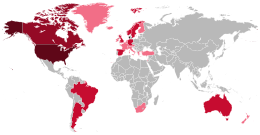| Total population | |
|---|---|
c. 8 million
 | |
| Regions with significant populations | |
| 5,961,249[1] | |
| 1,430,897[2] | |
| 207,470[3][4] | |
| 52,510[5] | |
| 52,000[6][7][8] | |
| 50,413[9] | |
| 50,000[10] | |
| 48,000[11][12] | |
| 42,602[13] | |
| 18,493 (Danish born only)[14] | |
| 10,000[15] | |
| 7,000[16] | |
| 4,251[17] | |
| 4,214[18] | |
| 3,507[19] | |
| 2,084[20] | |
| 1,528[21] | |
| 1,281[22] | |
| 941[23] | |
| 809[24] | |
| 400[25] | |
| Languages | |
| Danish | |
| Religion | |
| Lutheranism (Church of Denmark)[26] Further details: Religion in Denmark | |
Danes (Danish: danskere, pronounced [ˈtænskɐɐ]), or Danish people, are an ethnic group and nationality native to Denmark and a modern nation identified with the country of Denmark.[27] This connection may be ancestral, legal, historical, or cultural.
Danes generally regard themselves as a nationality and reserve the word "ethnic" for the description of recent immigrants,[28] sometimes referred to as "new Danes".[29] The contemporary Danish national identity is based on the idea of "Danishness", which is founded on principles formed through historical cultural connections and is typically not based on ethnic heritage.[30]
- ^ "Befolkningstal" (in Danish). Dst.dk. Retrieved 15 February 2024.
- ^ "Dane". Archived from the original on 13 November 2007. Retrieved 7 July 2017.
- ^ "Ethnocultural Portrait of Canada – Data table". 2.statcan.ca. 6 October 2010. Archived from the original on 1 November 2009. Retrieved 11 March 2015.
- ^ "Ethnic Origin, both sexes, age (total), Canada, 2016 Census – 25% Sample data". Canada 2016 Census. Statistics Canada. 20 February 2019. Archived from the original on 12 November 2020. Retrieved 30 January 2020.
- ^ Statistics Norway. "Persons with immigrant background by immigration category, country background and sex. 1 January 2009 (Immigrants and Norwegian-norn to immigrant parents + Other immigrant background)". Archived from the original on 12 November 2011. Retrieved 27 August 2009.
- ^ "World Migration | International Organization for Migration". Archived from the original on 1 May 2019. Retrieved 7 August 2020.
- ^ Sá, Carlos Augusto Trojaner de. "Por uma busca de dinamarqueses no Brasil: um estudo de caso inicial" (PDF). Revista do Historiador. Archived (PDF) from the original on 9 August 2021. Retrieved 7 August 2020.
- ^ "Reportagens". revistagloborural.globo.com. Archived from the original on 28 January 2016.
- ^ "Improved access to historical census data". Censusdata.abs.gov.au. Archived from the original on 13 September 2019. Retrieved 11 March 2015.
- ^ "National Minorities". Archived from the original on 24 June 2008.
- ^ Flott, Søren (2020). Rejsen mod syd. Historien om de danske udvandrere til Argentina. Lindhardt og Ringhof. p. 315. ISBN 978-8711906675. Archived from the original on 28 September 2023. Retrieved 2 October 2020.
- ^ "Danes in Argentina". Archived from the original on 16 January 2010.
- ^ "Tabeller over Sveriges befolkning 2005" (PDF). Scb.se. Archived (PDF) from the original on 3 March 2016. Retrieved 11 March 2015.
- ^ "UK | Born Abroad | Denmark". BBC News. Archived from the original on 12 December 2008. Retrieved 11 March 2015.
- ^ "Global Migration Map: Origins and Destinations, 1990–2017". Pew Research Center's Global Attitudes Project. Archived from the original on 30 June 2019. Retrieved 13 August 2021.
- ^ Gynther Adolphsen. "6000–7000 danskere bor ved den franske Riviera – Frankrig". Udvandrerne.dk. Archived from the original on 2 April 2015. Retrieved 11 March 2015.
- ^ "Hvor mange dansker bor i udlandet". Statsborger.dk. 28 June 2010. Archived from the original on 23 February 2015. Retrieved 2015-03-11.
- ^ "Population by country of birth, sex and age 1 January 1998-2022". Statistics Iceland. Archived from the original on 28 August 2023. Retrieved 28 August 2023.
- ^ "More Census 96 Counts People". Archived from the original on 24 March 2009.
- ^ "Danesi in Italia – statistiche e distribuzione per regione". Archived from the original on 14 September 2019. Retrieved 19 September 2019.
- ^ "Sefstat" (PDF). Archived (PDF) from the original on 23 June 2022. Retrieved 28 May 2023.
- ^ "Place birth age group". Archived from the original on 12 August 2011.
- ^ "在留外国人統計" (in Japanese). e-stat.go.jp. Retrieved 11 March 2015.
- ^ "Bevölkerung nach Staatsangehörigkeit und Geburtsland". www.statistik.at. Archived from the original on 4 September 2015. Retrieved 31 July 2015.
- ^ "Interview With Ambassador Of Denmark Jan Top Christensen". Archived from the original on 23 November 2011.
- ^ Fler lämnade kyrkan i Danmark Archived 13 April 2016 at the Wayback Machine 3.1.2015 Kyrkans tidning
- ^ Christopher Muscato (2018). "Denmark Ethnic Groups". University of Northern Colorado. Archived from the original on 27 March 2019. Retrieved 3 February 2019.
- ^ Jeffrey Cole (2011). Ethnic Groups of Europe: An Encyclopedia. ABC-CLIO. p. 103. ISBN 978-1-59884-302-6. Archived from the original on 28 September 2023. Retrieved 3 February 2019.
- ^ Jorgen Nielsen (2011). Islam in Denmark: The Challenge of Diversity. Lexington Books. p. 233. ISBN 978-0-7391-7013-7. Archived from the original on 28 September 2023. Retrieved 3 February 2019.
- ^ "Denmark Demographics". WorldAtlas. 31 August 2018. Archived from the original on 24 April 2019. Retrieved 3 February 2019.